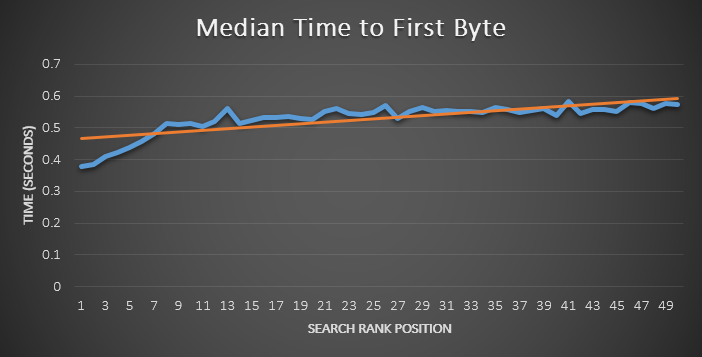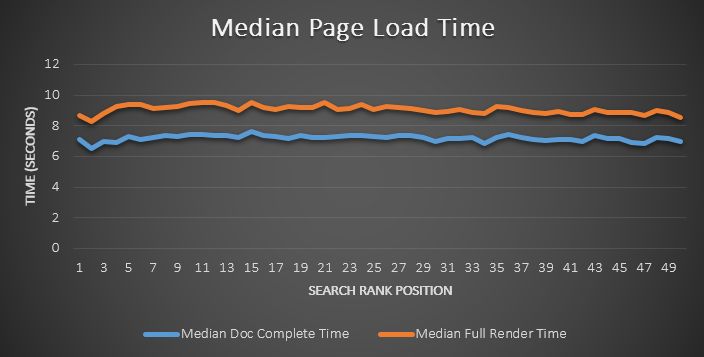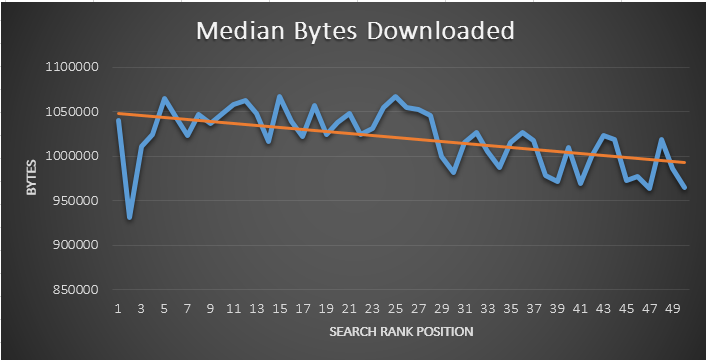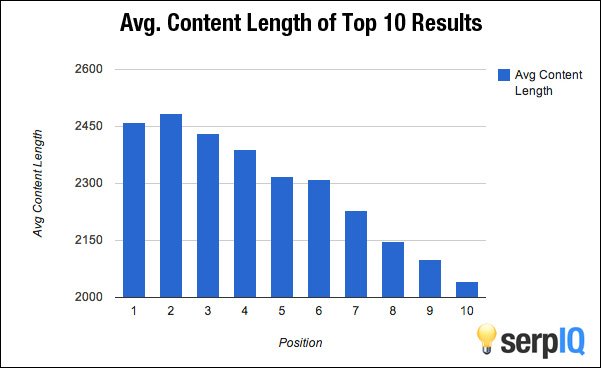Against the background of a huge amount of materials on “Google takes into account speed” and “Yandex takes into account behavioral factors” I wanted to restore order and deal with the question: how does the speed and availability of a site affect the effectiveness of (search) promotion. The topic was not really touched anywhere, and rumors circulate around the industry rather than concrete facts.
The study includes a selection of relevant quantitative studies, and a survey of market experts for the link between the site’s speed indicators and quantitative promotion indicators.
Google considers site speed
He does it in different ways. Typically, there are 3-4 of the most famous points of influence of site speed: on search results, on the ranking of contextual ads and on the convenience of the site. It was established experimentally that the response time of the server (not the full time of loading the site) has a direct impact on the ranking of requests. At the same time, the leaders of the issue have significantly less time than even at the end of the top ten – 0.38 against 0.51 (one and a half times less). Further, the situation is almost leveling off, but the difference of 0.1-0.2s may turn out to be significant with other things being equal (why so – the comments of the experts are a little further).

Google also takes into account the location of the site server.
The location of the server may be affected if it is different from the location of the request. Especially important in the search for “in your region.”
Regarding the download speed of the site, no such pattern was found, but if you compare two graphs – the average amount of downloaded data and the average download time, it becomes obvious that sites at high positions are not only more “heavy”, but also better optimized.


This is supported by the dependence of the length of the text on the page on the position in the search (it is clear that the number of letters does not affect the loading time, but usually the text is accompanied by illustrations, advertising and interactive blocks, which complicates the site loading):

Exactly how Google takes into account the availability of the site in the ranking, no one has investigated for sure. But the presence of “broken” links (or pages with a server error) is a negative factor. Although the official certificate rather vaguely formulates what exactly Google takes into account.
Monitor site performance and optimize download time. Google is committed to maximizing user experience and providing them with the most relevant results. Fast sites increase user satisfaction and improve the overall quality of the Internet (especially for users using a slow connection). We hope that as webmasters improve their sites, their overall speed will increase.
Site loading speed is calculated using many indicators, including Google Analytics, Chrome, and possibly synthetic modeling on the server when crawling a spider. But no one has yet revealed a direct influence on the position in the search. In this case, the indicator of the total page load time can be rather easily controlled by transferring the loading of the site objects for the onload event. Perhaps, including due to such manipulations, the download speed of the site is not directly taken into account.
Yandex considers availability
As the official statement says:
The choice of hosting. When choosing a hosting site, you should consider the access speed and time between failures. Try to use the hosting that provides the best speed of access to the site and the shortest time during which the site may be unavailable due to technical problems. Choose a reliable hosting so that your site is always accessible to users.
The server’s response time (often replacing it with the full page load time) affects the ranking in Yandex, robots start to log in less frequently and index less if the server responds for a long time.
Accounting for behavioral factors does not specifically include the server response time or the full page load time, but takes them to the area of bounce rate: when there is a long waiting time, the number of visitors who prematurely closed the site increases. And the last factor is taken into account by Yandex.
Page loading speed is important
The direct impact of the full response time of the server, the white screen time in the browser (to a greater extent) and the page opening time (to a lesser extent) on the bounce rate when visiting the site has long been studied. In particular, WEBO Software recorded an improvement from 12% to 40% in the effectiveness of the site at 2-3 times the acceleration (from 7-15 seconds to 3-5). If we talk about Western studies, the most illustrative will be the following graphics:
But the bounce rate only affects the behavioral ranking factors, what else can the site speed affect in search engine advancement? We interviewed several market experts; according to their reviews, a fairly convincing picture is being drawn up.
According to Lada Lebedyantseva, internet marketer at Alex:
Download speed directly affects user factors. The results were quite unexpected, but maybe it depends on the subject. Reducing download time directly reduces bounce rates. Of course it is difficult to argue that this is exactly the positive effect on the position, but the bounce rate decreases noticeably. Reducing the download time by one second increases the conversion by two percent (but the function is not linear). And the increase in download time up to 7 seconds increases the bounce rate by 30%. All that loads 7 seconds or more causes an increase in the bounce rate. Although the data are obtained as a result of internal research on a small sample of sites.
Yevgeny Kholin, executive director of the Apex Internet agency, reinforces the importance of the full time of loading pages and behavioral factors:
I can definitely say that braking sites are less frequently visited by a Yandex robot, and this, in turn, affects the effectiveness of the promotion, since such a site is less often reindexed. After optimizing the code and transferring to a more powerful server, the frequency of visits by the robot increases and the number of indexed pages increases. But I am not ready to say that this directly affects the effectiveness of promotion. Rather, a reduction in the bounce rate, which actually decreases after an increase in page loading speed, affects the effectiveness of promotion.
For one of our projects, the load time of the main page decreased from 2.4 seconds to 1.4 seconds, and for promoted internal pages (they did not test everything) also decreased, on average, by a second. This increased the indexing of pages, the increase in the number of pages visited by the robot was about 5%, the number of pages in the search increased by about 30%. The frequency and number of requests by the Yandex robot increased – if, before optimization, the robot visited the site 2-3 times a week and was usually limited to one page, then after optimizing the download speed, the robot visits the site 4-5 times a week, bypassing on average 10 pages at a time. Also during the optimization, the errors 502 were completely removed. The response time of the server of this site is 0.3 to 0.6 seconds.
Dmitry Kolotov, Executive Director of WebProfiters, states:
There is no direct influence of site speed on the effectiveness of promotion. Here the rule only works in one direction: if the site loads for a long time, or sometimes it does not load at all, then the positions will decrease with time. This fact is confirmed by 3 simple observations:
In the top 10 there are no sites that have problems with the speed of loading pages.
The higher the download speed, the lower the bounce rate. The failure rate is one of the important ranking factors.
No problems with loading – there will be no problems with indexing (other things being equal). There will be no problems with indexing – users will find what they want – the site has more chances to maintain / strengthen positions.
Maxim Sergeev, Head of Search Promotion, TitanSoft, provides the following information:
For a site with attendance of 30-50 thousand people per day with an increase in download time by 0.15 seconds, search traffic drops by 20%. The main parameter affecting the speed of loading pages – server-side caching and layout is clean without unnecessary code.
Conclusions
Summarizing and summarizing the official facts, research and opinions, we can say that the following parameters of the site affect its effectiveness (and the effectiveness of its promotion):
Directly affects the response time of the server. Given the network delays, it should be no more than 300ms. Even a slight increase in its negative impact on the number of pages and position in the issue (negative effect of 10-30%).
Directly affects the availability of the site (including the number of pages with server errors). Nobody measured the negative effect here, but by analogy with the server response time (reducing the frequency of site visits by the search robot), losses of 5-15% are possible in positions, reach and visitors.
The total load time of the pages of the site affects indirectly through behavioral factors The direct effect is difficult to estimate, it ranges from 5% to 20% with a decrease in site loading time to 4 seconds. If your site takes less than 7 seconds to load, then the great effect of acceleration is difficult to expect.
P.S. and for a snack – video from TopExpert, about the ranking factors that take into account the speed